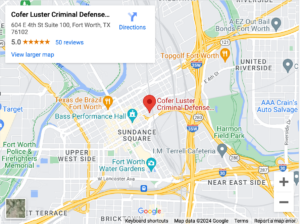
If you’re facing extortion charges in Fort Worth, TX, it’s important to have a lawyer who understands the complexities of these cases. Extortion allegations can carry serious consequences and affect many areas of a defendant’s life. Cofer Luster Criminal Defense Lawyers can guide you through the legal process and help protect your rights.
If you have any questions about charges you’re facing in Fort Worth, Texas, we’re here for you. Call (682) 777-3336 or contact us today to schedule a confidential consultation with a Fort Worth extortion attorney.
How Cofer Luster Criminal Defense Lawyers Can Help if You’re Arrested for Extortion in Fort Worth, TX

If you’ve been arrested for extortion in Fort Worth, TX, we are here to help you understand the charges and defend your rights throughout the process. Facing legal challenges can be difficult, and we are dedicated to offering the necessary support and direction. The attorneys at Cofer Luster Criminal Defense Lawyers bring over 60 years of collective experience to the fight for our clients’ rights.
Here’s how our Fort Worth federal crimes lawyers can assist:
- We can help explain the charges and what behaviors led to them so you know exactly what’s going on.
- Our team is experienced in handling federal extortion cases, ready to guide you if you’re facing charges at that level as well.
- We work directly with prosecutors to negotiate a plea deal on your behalf, aiming to reduce charges or secure more favorable outcomes whenever possible.
- If it becomes necessary, we are always prepared to defend you at trial. We will never pressure you to take a plea deal that isn’t in your best interest or that you aren’t happy with.
Having a knowledgeable legal team by your side can help you navigate an extortion case in Fort Worth, Texas. Contact Cofer Luster Criminal Defense Lawyers to schedule a consultation with a Fort Worth extortion attorney.
Overview of Extortion in Texas
In Texas, extortion involves obtaining money, property, or some other benefit by using threats. These threats can include causing physical harm, damaging property, ruining someone’s reputation, or even influencing government actions in an unfavorable way. The main point is that the person being threatened feels pressured to comply because of these potential consequences.
What separates extortion from robbery is the timing and nature of the fear involved. With robbery, the victim faces an immediate threat of physical harm. In extortion, the threat might happen in the future, or it could involve harm to a person’s image or standing rather than direct physical injury.
What Are the Penalties for Extortion in Fort Worth, Texas?
In Fort Worth, the penalties for extortion depend mostly on how much money, property, or services were taken through the crime. The greater the value involved, the harsher the punishment tends to be.
- If the amount involved is between $2,500 and $30,000, the offense is usually treated as a state jail felony. This carries up to 2 years in jail.
- Theft valued from $30,000 up to $150,000, or theft involving certain livestock, can result in a third-degree felony charge. This leads to between 2 and 10 years in prison.
- When the value is between $150,000 and $300,000, the offense can be classified as a second-degree felony. This can lead to between 2 and 20 years in prison.
- For thefts over $300,000, the charge could be a first-degree felony, which carries the most serious consequences. This carries between 5 and 99 years in prison.
Understanding how these value thresholds affect the charges can help you better prepare for what lies ahead if you are facing extortion accusations.
What Defenses Can Be Raised if I’m Arrested for Extortion?
If you’re arrested for extortion, there are several defenses that might apply to help challenge the charges against you. Here are some common ones your criminal defense lawyer may utilize:
Mistake of Fact
This defense argues that you genuinely believed you had permission to take the property, or you misunderstood the situation. This can show there was no criminal intent.
Lack of Intent to Deprive
Extortion requires the intention to unlawfully take or keep someone else’s property. If you can prove that you didn’t intend to permanently deprive the owner, but instead acted under a misunderstanding or had a plan to return the money or property, this can weaken the prosecution’s case.
Consent Given by the Owner
If the property owner willingly agreed to give you the money or items in question, it’s not extortion. Showing that consent was freely given can be a strong defense against these charges.
The right defense depends on your specific circumstances, so having a good lawyer review your case is essential.
Schedule a Confidential Case Evaluation With Our Fort Worth Extortion Attorney
Facing extortion charges can be overwhelming, but you don’t have to go through it without support. Understanding the laws and potential penalties is an important step in protecting your future.
Having an experienced attorney by your side gives you the best chance possible of obtaining a positive outcome in your case. Contact Cofer Luster Criminal Defense Lawyers to schedule a consultation with a Fort Worth extortion attorney.

